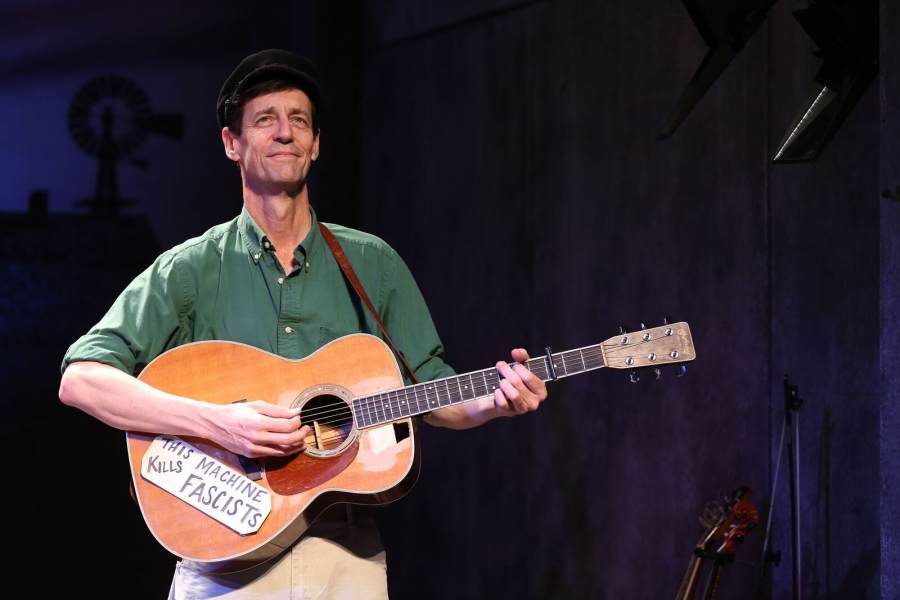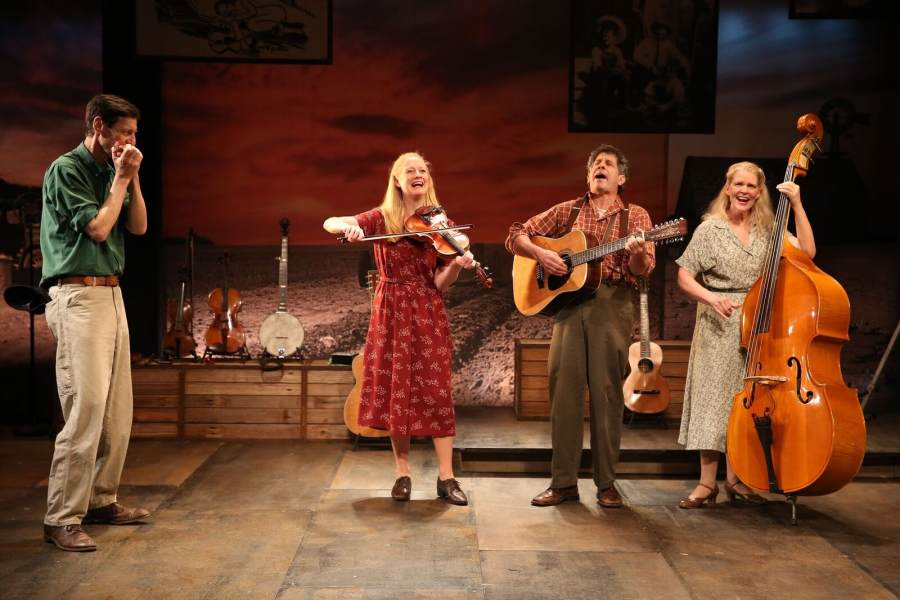

Woody Sez (at the Irish Repertory Theatre through July 23) tells the story of American folk-protest singer-songwriter Woody Guthrie in his own words. The show features over 30 of Woody's songs, played on a range of instruments, from the guitar and violin to the dulcimer and the spoons. David M. Lutken, who co-devised the show, stars as Woody, supported by a cast of equally talented, high-energy musician actors. In a rare moment of downtime, Lutken spoke to us about creating Woody Sez, playing the show for audiences around the world, and maintaining high energy for every performance. Of course, we also talked about Woody Guthrie himself.
Can you tell us a little bit about the process of creating Woody Sez?
I’ve been a musician all my life, playing folk music and all other kinds of music. And in 1988, I met Harold Leventhal, who was Woody Guthrie’s old manager. Of course, there are many shows that have been done over the years about Woody Guthrie and his music. And I met Mr. Leventhal in 1988 doing another one of those shows. It’s a great show, still out there, and gets done quite often. And over the years of knowing him for the next twelve or fifteen years, he decided that he liked me and the music that I played, and so he encouraged me to write something that he thought was kind of missing, which was a show that was a biography of Woody. So he started me off with some material of his from what became the Woody Guthrie archives. He gave me, actually it’s kind of based on, mostly on Woody Guthrie’s column, “Woody Sez," which he wrote from 1939 to 1941, and also a couple of other things - notably, of course, his autobiography, Bound for Glory, and a kind of a pamphlet, a treatise, that he wrote, called “American Folk Songs.” Those are really the three main sources.
I started off by writing a children’s show about American history and Woody Guthrie’s life and music that I still do every once in a while, in a school up in Hartford, CT. And since I’m not really a writer, I figured I would try that and see how that worked. And Mr. Leventhal and Nora Guthrie – who began to take over Woody Guthrie Publications as Mr. Leventhal got older – the two of them liked it and so I continued, and then I hired some collaborators to help me and I continued to develop the script for the Edinburgh Festival in 2007. We started off, if I remember right, with about fifteen or sixteen songs, and it was one hour long, and we did it at the Edinburgh Festival in 2007, and then played at festivals and theatres all over Europe for quite a few years before we ever came to the United States, and continued to expand on the scope of the story. Then finally we had our first major production in the United States, in 2012, at the American Repertory Theatre. By that time, that was after our production in London, which was sort of the first fully developed production - at the Arts Theatre in London - and then we brought it back to the United States in 2012 and I’ve continued to expand on the script since then.
But the short answer to your question is: it was a long, slow process for me. I list myself not as the writer but as the deviser, because it really is based, an awful lot of it, about 70 percent of it, is direct quotes from Woody Guthrie that I have kind of woven together.
Woody Sez has toured Europe, the British Isles, the U.S., the Middle East, and China. That’s a wide range of places. Did you find that audiences reacted differently to the show in these different countries?
Well, yes and no. I mean, we’ve been to so many far-flung places that the reaction is quite frequently based on just the many instruments. For instance, in China, most of the people that we played for had never heard of Woody Guthrie, but they were very interested in the music and the musicianship. And of course, the story made a lot of sense to folks over there. They don't know an awful lot about American history, and I think that that was interesting to them: to hear about the Great Depression and our involvement in WWII, which is also kind of a foreign concept to folks in China. Their take on history is very different.
Whereas people in the Middle East, we played in both Israel and in the West Bank in Palestine, and reactions of people there were very different as well. In Israel, an awful lot of people who came to see us were American expatriates who’d moved to Israel - a lot of red diaper babies - and they were raised on this kind of music and loved Woody Guthrie from a very early age. Whereas the reaction in the West Bank, when we played in schools and cities over there, 2015 I guess, was quite fascinating. You know I’m making blanket generalizations, but it’s true that they were very interested in the protest song aspect of Woody’s career. There it was translated into Arabic, we had super-titles, which was really fascinating. And as you can imagine - and neither of us being Americans can quite fathom - their take on a song like “This Land Is Your Land, This Land Is My Land” - it’s very, very different for people there.
And then one of our favorites was Glasgow, in Scotland. We played there at the Celtic connection festival and every time we played “The Internationale," the entire room would stand up and sing along with us (laughs) so it’s fascinating.

You seem very comfortable in the role of Woody Guthrie, and it’s obviously something you’ve been doing for a while. How did you prepare for the role?
Well, I grew up in Texas, I guess. I’m the youngest of four children. And all of my siblings played instruments and sang songs, and I spent a lot of time as a youngster in North Carolina, and learned a lot of old music there, old Appalachian music, and that’s the same kind of stuff that Woody Guthrie grew up on. So I guess really, in some ways, my life as a singer and an actor and erstwhile whatever else I’ve done, has been a little bit like Woody Guthrie’s life in some respect. Course I’m not a famous folk-protest songwriter, but I have traveled an awful lot and sang in an awful lot of places, both very, very fancy and very, very un-fancy.
As you were preparing for this show, was there anything you learned about Woody that surprised you?
Oh my goodness, well yes. I mean, that really, when I first spoke to Mr. Leventhal, back in the early 1990s about doing this, that was what had fascinated me, was I had read Bound for Glory as a younger person, but Bound for Glory of course was written by Woody, and a lot of it is sort of fictionalized, and kind of amalgamated adventures from his life. But the more you read about him and the life that he lived, it’s kind of unbelievable in some respects to me - just the fascinating twists and turns of his life, you know, as any individual has - but that the music that he wrote came out of the life that he lived, just increased in depth and profundity. Every turn I took of finding out more about him and more about the life that he didn’t exactly write about - and in the show there are some things that I’ve certainly glossed over about his life - but I was trying my best to make this Woody Guthrie’s life from his own point of view. And Woody, you know, many people will tell you he was not a very nice guy, and that’s probably true. Everybody can be kind of a bonehead sometimes, and Woody may have been so more than others. But he certainly had an awful lot of stuff going on both inside and out with his life during his very young days, and the 20's and 30's and 40's. And the concentration of the script, of course, are the things that he said about himself and about the world. So if some of it comes off a little bit groovier than he actually may have been, well that’s just because it’s him talking.
The show is very high energy, and you and the other cast members all seemed like you were having so much fun up there. How do you keep up that energy and enthusiasm after performing the show so many times?
Well, an awful lot of that energy comes from the audience, first of all. And I always say my rule is that everybody in the band has to be better than me, and make me look better. But I always go back, when I am asked that question, to old Joe DiMaggio. Somebody asked Joe DiMaggio a similar question: "When you get up to bat, how do you bring the same amount of focus and concentration and energy to what you’re doing?" and he said, “Well, every time you go, every time you play the game, every time you get out there, there’s an awful lot of people in the stands, and somebody out there, it’s their first time coming to see a game. And somebody else, it’s their last time.” (laughs) I don’t really think that he really meant that people walked out of the stadium and dropped over dead, but he did mean that, to him, and I guess to me, that it really does mean something kind of absolute and in the moment every time you’re out there. Because it is somebody’s first time and it’s somebody else’s last opportunity for this particular thing going live.
I know it’s hard to choose, but do you have a favorite Woody Guthrie song?
Well it is very, very difficult to choose, but I do have a favorite Woody Guthrie song, and it’s ironic because it’s not in the show. Actually, I put one line from the song in at the very end. But my favorite Woody Guthrie song is “Pretty Boy Floyd.”
OK, I’m going to ask you to channel Woody here for a minute. What do you think he would say to Americans today?
I think he would say to get out and vote.